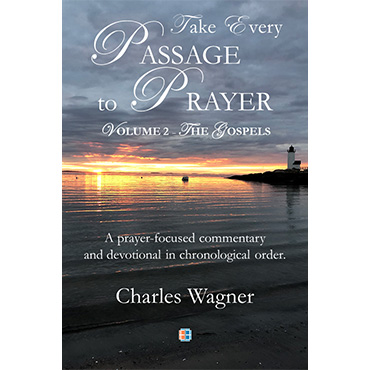The Gramazin Blog

Jesusí Discussion at the Festival of Tabernacles
Take Every Passage to Prayer - Volume 2, The Gospels
Friday August 09, 2024
John 7:10-52
Father, please inspire my friends and loved ones who don't know You to search for Jesus. Help them to find Him and to know He is their Messiah, the savior who has cleansed them of all sin. Help them to obey Jesus and, as a result, receive wisdom and understanding that only comes from surrender. Father, Your Word tells us in this passage that all truth is rooted in the gospel. Those who have not embraced the gospel do not know truth and cannot know truth. Father, help me to teach truth by teaching the gospel. Father, thank You for the Holy Spirit who continuously refreshes me with the peace and joy of having a relationship with Jesus. Amen.
Father, Jesus’ brothers went to the Festival of Tabernacles in Jerusalem, leaving Jesus behind in Galilee. They were no doubt disappointed that Jesus would not join them in a public spectacle of miracles that would bring fame and fortune to the family. It must have seemed odd that their “super religious” brother had chosen to stay home from the Festival of Tabernacles.
Jesus had no intention to stay home from the festival You had commanded Him to attend. However, He was going to attend secretly, sneaking Himself into Jerusalem incognito or in the dark of night. The text tells us that the religious authorities were searching in the crowd of thousands for Jesus. I can imagine there were people at each of the city gates and others perched on rooftops looking for Him. They could not locate Him.
The talk of the festival was the work and teachings of Jesus of Nazareth. Some concluded that Jesus was a good man, a godly and righteous man. Others were more cynical, believing Jesus was pulling the wool over everyone’s eyes, deliberately deceiving people with His nonsensical talk that He was the Son of God on a mission to save the world from sin. Regardless of their perspective on Jesus, the people on both sides of the debate shared the same reluctance to talk about Jesus within the hearing of the religious authorities. The mere mention of Jesus’ name obviously infuriated the Jewish leaders. It was better for the people to say what they thought about Jesus in the privacy of their booths.
However, half-way through the festival, Jesus suddenly made His appearance and began to teach in the temple courts. While the text doesn’t say so, logic informs us that word quickly spread around Jerusalem and people scurried to hear Jesus speak. The text does tell us that the people were amazed by His teaching. He seemed to know far more than the religious leaders and, yet, He had not been trained like they had been. They asked Jesus how He became so knowledgeable.
Father, Jesus answered that His knowledge came from His relationship with You. He taught that anyone who desires to obey You will understand Your Word and be able to discern whether someone is speaking Biblical truth. Jesus then said that the only people who tell the truth are those who say only the things that You have told them to say. The person who speaks for himself, and not for You, has an agenda to gain his own glory.
The religious leaders, and their henchmen, have no doubt arrived on the scene and Jesus sees them. Speaking over the crowd to these intruders, Jesus asks why the people want to kill Him. The ignorant people in the crowd, and/or the deceptive thugs who have come to get Jesus, essentially called Jesus paranoid or demon-possessed, telling Him that no one is out to get Him.
However, Jesus knew what He was talking about. He had apparently performed a miracle on the Sabbath either before or during His teaching in the temple courts the details of which were not described in the gospel accounts. The text tells us that the people were amazed. Jesus knew that the lame charge the religious leaders had come up with to justify His execution was that He had violated the law of Moses by healing on the Sabbath.
Jesus then addressed the hypocrisy of the religious leaders. They had no problem performing a circumcision on the Sabbath, in accordance with the law of Moses, if a male baby had been born seven days before. Since the religious leaders were not truly obeying the Mosaic law about the Sabbath themselves, their public display of condemnation of Jesus for disobeying the same law was motivated only by “mere appearances.” They wanted to look righteous and spiritual for the crowd to see.
Jesus then gives us a primer on how to judge people correctly. We should stop judging Him and others by our emotional reaction to something we see only on the surface (“mere appearances”). The religious leaders were doing just that. Instead, we should judge people correctly by performing extensive research into the matter and uncovering conclusive evidence.
Other religious authorities who were searching for Jesus arrived on the scene. They inquired as to why the first group of religious leaders had not already arrested Jesus. They speculated that the first group had been deceived by Jesus and had come to the conclusion that Jesus was the Messiah. They immediately attempted to “deprogram” their brethren, stating that the true Messiah will suddenly appear in the temple (Malachi 3:1). He will not be an individual with a hometown. Everyone knew that Jesus was from Nazareth.
Father, Jesus responded by acknowledging His earthly home was Nazareth but that He is really from heaven, sent by You with authority. Jesus claimed that only He knew You. His statement came across as “holier than thou” to that first century audience. His statement also insulted the religious authorities by telling them they didn’t know You.
Many in the crowd wanted to seize Jesus, perhaps lock him up in an institution or to kill him for blaspheme. However, many other people in the crowd put their faith in Jesus, believing He had already done more than enough to prove that He was the Messiah. Frightened by the influence Jesus had on many of the residents of Jerusalem, the chief priests and Pharisees sent for the temple guards to come and arrest Jesus. But Jesus was protected by You because it wasn’t His time to die.
Father, Jesus said to those who were listening that there will come a time when people look for Him but won’t be able to find Him. He will have returned to heaven to be with You. Those who look for Him won’t be allowed into heaven to come near to Him because they had rejected Jesus on earth.
However, humans are a slow to understand. The people thought that Jesus was referring to some place on earth where He could hide, and no one would find Him. Some suggested that He had plans to go to Greece.
The crowd dispersed and Jesus faded into obscurity for a few days. Were Jesus’ disciples with Him? How about the women who supported Jesus in ministry? The text doesn’t tell us. However, given the detail in the gospel of John about the Jesus’ encounter with the crowd at the temple, it is reasonable to conclude the John had traveled to the Festival of Tabernacles with Jesus. The two most likely ministered to the people of Jerusalem one-on-one for several days.
The last day of the festival was the most important. It was the Sabbath, a day of rest. The crowds had gathered around the temple. Jesus shouted to the crowd,
“Let anyone who is thirsty come to me for a drink. Whoever believes in me, as Scripture has said, rivers of living water will flow from within them (NIV)”
Is Jesus saying that He is an everlasting canteen of fresh water for those who walk in the parched desert? No. Jesus is referring to the Sermon on the Mount, when He said in Matthew 5:6 that those who hunger and thirst for righteousness shall be filled. With what? The Holy Spirit, the river of living water that flows from within them. Father, those who thirst to be refreshed in soul and spirit as they walk with You will walk with You forever and ever. A relationship with Jesus is what mankind was designed to enjoy. It is what the human soul longs for, even if the person does not know it. Jesus refreshes the soul like nothing and no one else.
The text informs us that the people were divided. Some thought Jesus was prophet, a messenger of God similar to Isaiah, Jeremiah, or Malachi. Others thought Jesus was the Messiah, the one promised throughout the Old Testament. However, the people were confused. The Messiah was to come from Bethlehem (Micah 5:2) but Jesus had come from Nazareth (Galilee, Matthew 2:23). They did not know that the one who is to be called a Nazarene would first be born in Bethlehem.
The temple guards returned to the chief priests and Pharisees without Jesus in custody. They were asked why they had failed in their mission. The guards shared that they too had been persuaded by Jesus. The Pharisees insulted the guards, essentially calling them gullible fools because they had been deceived by Jesus. The Pharisees, who knew the law, claimed they hadn’t been fooled by Jesus. The guards were told that only uneducated fools believed in Jesus. Elitists are nasty people.
We last heard from Nicodemus in the section entitled, “Jesus in Jerusalem: Nicodemus”. He had come to Jesus in the dark of the night to explore the gospel with Him. While we never heard for sure that Nicodemus had come to faith, we do know that Nicodemus became Jesus’ faithful servant. In this case, Nicodemus, who is a Pharisee, called out the other Pharisees.
“You cannot judge a man without giving Him the opportunity to defend himself. You can’t judge a man based on your feelings.”
Nicodemus was overruled by the Pharisees who concluded that the Messiah can only come from Bethlehem in Judea. He does not come from Galilee, a region the religious authorities in Jerusalem believed was a place of intellectually inferior people. Jesus could not be the Messiah because He was not one of the elites from the region of Jerusalem. They believed all of the common and uneducated people had been deceived by Jesus. However, Father, the truth is that it was the Pharisees and religious leaders who had been deceived by Satan. Amen.
According to Deuteronomy 16:16, the Festival of Tabernacles was one of the three feasts that Jews were required to observe each year. It was held in the fall, in the September and October timeframe. Jews were required to bring along a gift to the Lord since the harvest had just been completed. The festival was a celebration of God’s deliverance and provision for His people, both current and in the past. Solomon’s temple was dedicated during this festival (1 Kings 8:2). Ezra proclaimed the Word of God during this festival (Nehemiah 8). This festival is also called the Feast of the Ingathering, the Feast to the Lord, and the Feast of Booths (Exodus 23:16, Deuteronomy 16:13). People lived in temporary shelters (booths) during the festival. Read Leviticus 23 for God’s commands regarding this festival. The festival is a reminder to 21st century believers that God will deliver us from our sin and that He has provided a Savior for us.
In Luke 24:16 we read that Jesus miraculously disguised His appearance so that the men on the road to Emmaus could not recognize Him. It is possible, therefore, that Jesus disguised His appearance at this festival as well.
Jesus is still making sudden appearances into people’s lives. Like He suddenly appeared to Saul on the road to Damascus (Acts 9), Jesus often makes a sudden appearance into sinner’s lives. They are confronted by the reality of the gospel with their eyes and ears opened. Jesus appears by a believer sharing the gospel or their testimony with them. Jesus also makes sudden appearances by believers showing acts of compassion for people in crisis.
Jesus has made a case in this text that each and every word that comes out of our mouth should be prayed about. It is likely that Jesus did pray about everything He said throughout His ministry.
Our enemy still loves to persecute believers in the 21st century with the idea that they are mentally ill.
The first mention of circumcision in the Bible is in Genesis 17:9-11, when God instructs Abraham to circumcise his family and any servants associated with him. This occurred long before the birth of Moses.
There is an appointed time and place for our death. There is nothing that will cause our death to occur before that time and there is nothing we can do to extend our life beyond that time. God carries out His plan for our lives and takes our life only when His plan for us has been completed. (Psalm 37:23-24, Psalm 138:8, Proverbs 19:21, Ephesians 2:10, Philippians 1:6).
The culture in which Jesus lived had been Hellenized by Alexander the Great. There is little doubt that Greek culture continued to have a major influence on the region. However, Rome had conquered the region and had become the cultural center of the Western world. People often traveled to and from Rome for business. Jesus would be recognized by someone if He hid in Rome. Therefore, it is not surprising that Greece was mentioned as a possible hiding place for Jesus.
Jesus is essentially holding a crusade, sharing the gospel with a crowd just as 20th century Billy Graham did.
The Arminian school of theology would state this is clear evidence the gospel is offered to every human being and that it is up to each person to drink from the water that Jesus offers. The Reformed school of theology would state that God inspires a person to desire the life giving water of the gospel and that such a person drinks because God has already led them to do so.
Living water is referred to in Jeremiah 2:13 (“the Lord”, verse 5), Jeremiah 17:13 (“the Lord”), Zechariah 14:8 (“the Lord”, verse 9), and Revelation 7:17 (based on Isaiah 49:10, verse 8 “the Lord”).† The “Lord” is ???????, the one true God, the existing One, Jehovah. By Jesus referring to Himself as the “living water”, He is stating that He is God.







